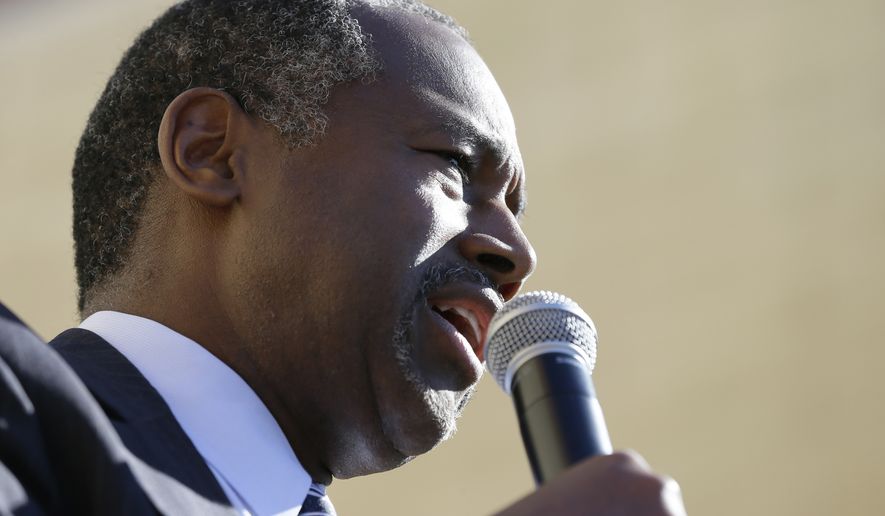As GOP presidential hopeful Ben Carson surges in polls, his slim public record is getting closer scrutiny, and the Club for Growth is releasing a white paper Thursday arguing the political newcomer has shown promise on cutting taxes and spending, but has made statements on regulations and health care that show he might not be a “pro-growth president.”
His support for a balanced budget amendment to the Constitution, and past comments backing a 10 percent income tax rate and lowering the corporate tax rate, drew praise from the free market advocacy group.
But the club says Mr. Carson’s support for government-run catastrophic health care, collective bargaining rights and the restoration of Glass-Steagall banking regulations, as well as his past pontification on “socialism’s positive aspects,” raise serious questions about his ideological underpinning.
“Ben Carson’s life story and his career in medicine are very impressive, but the full measure of his statements on economic liberty seems to indicate significant inconsistencies,” said Club for Growth President David McIntosh.
“For example, Carson has sharply criticized Obamacare, but has promoted a de facto nationalization of private health insurers. Likewise, he has called for needed entitlement reform, and yet recommends a new government-run catastrophic care program. Contradictions such as these have made it impossible for the Club for Growth to conclude that Dr. Carson would be a pro-growth president.”
The Carson campaign shrugged off the findings, dismissing the Club’s methods and conclusions.
“Easy for them to write when they knew from the start how they wanted their analysis to end,” said Doug Watts, a Carson spokesperson. “The club never reached out to our campaign, never solicited our views, never asked for a meeting with Dr. Carson. It is the club, and it is only interested in the growth of their own power. Dr. Carson has a message for them: They don’t get to decide, the people get to decide.”
He added, “The only growth they are concerned about is growth for their own pockets.”
Mr. Carson is the ninth candidate the club has evaluated, scoring each on their positions on everything from entitlements to free trade and tort reform.
Former Florida Gov. Jeb Bush, as well as Sens. Marco Rubio of Florida, Rand Paul of Kentucky and Ted Cruz of Texas, have earned positive reviews, while the group has panned the records of New Jersey Gov. Chris Christie, former Arkansas Gov. Mike Huckabee, Ohio Gov. John Kasich and Donald Trump, the front-runner in polls.
Like Mr. Trump, Mr. Carson has fed off voter outrage against Washington and now polls second, behind Mr. Trump, in national surveys.
Mr. Carson’s campaign committee also raised more money than any of his GOP rivals during the third quarter of the year.
On his website Mr. Carson advocates for ratifying a balanced budget amendment to the Constitution, tax-free Health Savings Accounts to help drive down costs and to “end the IRS as we know it” by adopting a “fairer, simpler” tax code.
The Club for Growth said it agrees with those stances, as well as Mr. Carson’s calls to lower the corporate tax rate and to adopt a “six-month tax hiatus” for multinational corporations that are willing to repatriate their overseas profits back to the United States.
But they question his plan to use 10 percent of those repatriated profits to set up “enterprise zones that would be set up in some of our major cities to create jobs for people who are unemployed and on welfare.”
They also question Mr. Carson’s loyalty to conservative ideas, pointing to donations he gave to Democratic House candidates in the 2000s and his support of “the development of new entitlements for government-run catastrophic health insurance.”
That program, which Mr. Carson detailed in his book “America the Beautiful,” would involve the federal government taking on responsibility for covering the costs of major health issues, paying for it by siphoning off 5 percent of insurance companies’ profits.
• Seth McLaughlin can be reached at smclaughlin@washingtontimes.com.




Please read our comment policy before commenting.